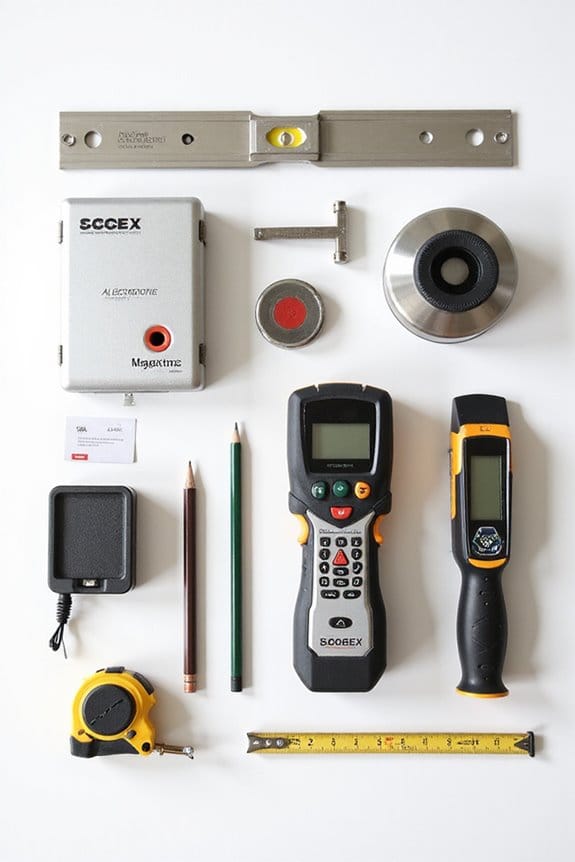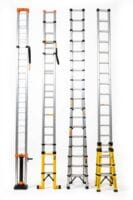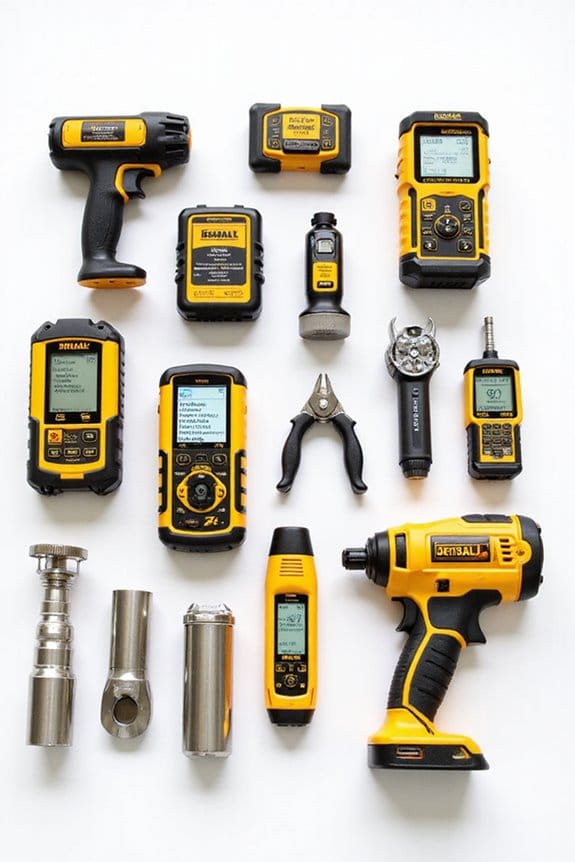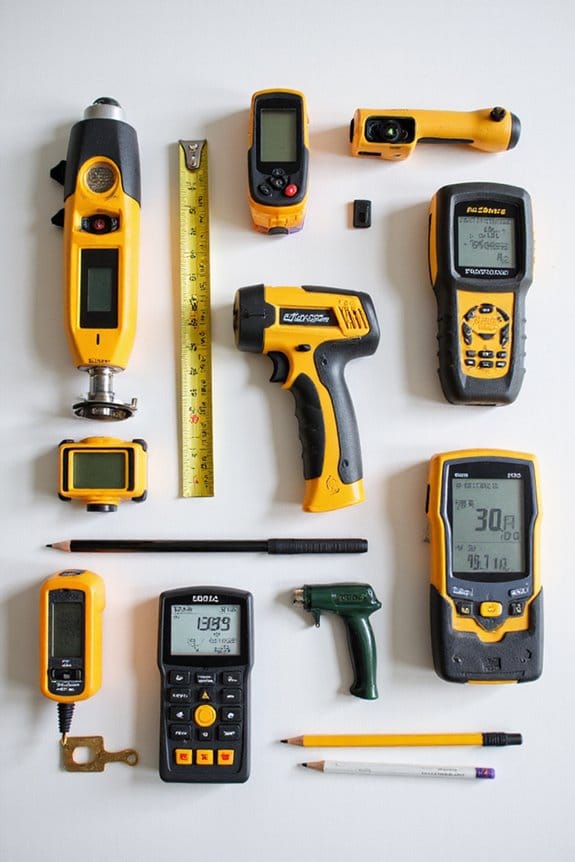I’ve found magnetic stud finders to be pretty great for DIY projects. Here’s why: 1) They’re super user-friendly—no batteries needed. 2) They’re portable and compact, so you can take them anywhere. 3) They provide reliable feedback when they find metal fasteners. However, they can miss studs sometimes or mistake metal pipes for screws. Overall, they’re a solid choice if you know what to look out for. Stick around to discover more comparisons between magnetic and electronic models!
Key Takeaways
- Magnetic stud finders are user-friendly, requiring no batteries or complex setup, making them ideal for quick projects.
- They are generally more cost-effective than electronic models while providing consistent detection of metal fasteners.
- Their durable design with fewer components reduces the likelihood of breakage, enhancing longevity.
- However, they have a limited detection range and may miss studs if user technique is not precise.
- Magnetic models cannot distinguish between metal studs and other metal objects, potentially leading to confusion during use.
Understanding Magnetic Stud Finders
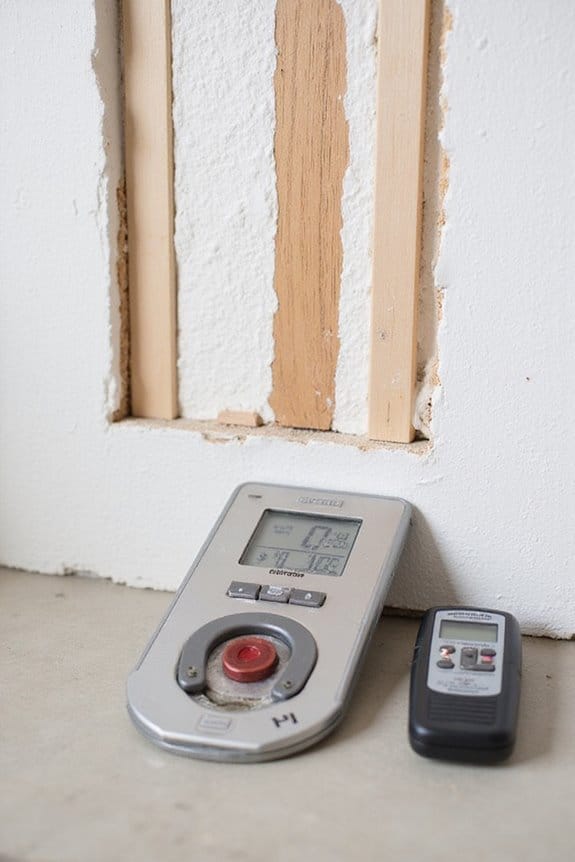
When you’re tackling a DIY project, like hanging shelves or mounting a TV, understanding magnetic stud finders can make your life a whole lot easier. These handy tools use types of magnets, specifically rare earth magnets, to locate metal fasteners in your walls. The stud finder history shows that these simple devices have evolved but remain user-friendly, requiring no batteries or complex setup.
Here’s why I love them:
- Simplicity: Just grab it and scan. No fuss!
- Portability: They fit in your pocket—perfect for on-the-go projects.
- Feedback: You’ll feel the magnet cling when you find a stud.
How Magnetic Stud Finders Work
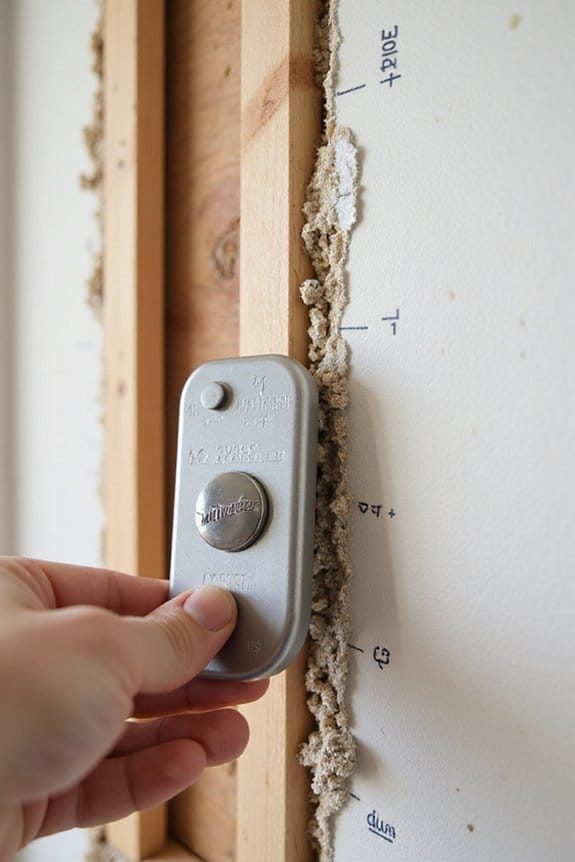
Magnetic stud finders work by leveraging the principles of magnetism to locate hidden metal fasteners in your walls—think of them as your trusty sidekick in the DIY world. Here’s how they operate:
- Magnetic Detection Methods: These devices use magnets to detect nails or screws embedded in the wall. As the magnet gets closer to a fastener, its pull becomes stronger, guiding you to the stud’s location.
- Stud Finder Materials: Some models use a stationary magnet, while others feature a moving neodymium magnet for improved sensitivity. The latter often provides audible or visual feedback, making your search easier.
Effectiveness and Accuracy of Magnetic Models
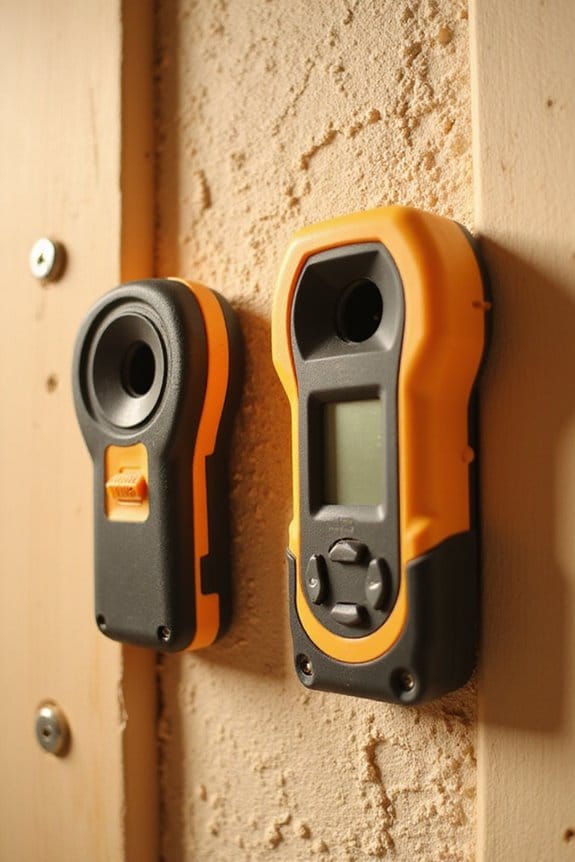
While you might think that all stud finders work the same way, the effectiveness and accuracy of magnetic models can vary considerably based on several factors. Here’s what I’ve learned:
- Magnetic Sensitivity: The strength of the magnet plays a huge role. Stronger magnets have better sensitivity and can locate fasteners more accurately.
- Detection Range: These models are best on modern drywall with metal screws or nails. But, they struggle with metal studs or thick walls, where their detection range can be limited.
- User Technique: Slow and steady scanning helps. Pausing can clarify fastener locations, and multiple passes can confirm findings.
- Wall Types: Older walls might not play nice, making detection tricky. Additionally, performance may vary based on wall thickness and material, which can influence detection reliability.
Advantages of Using Magnetic Stud Finders
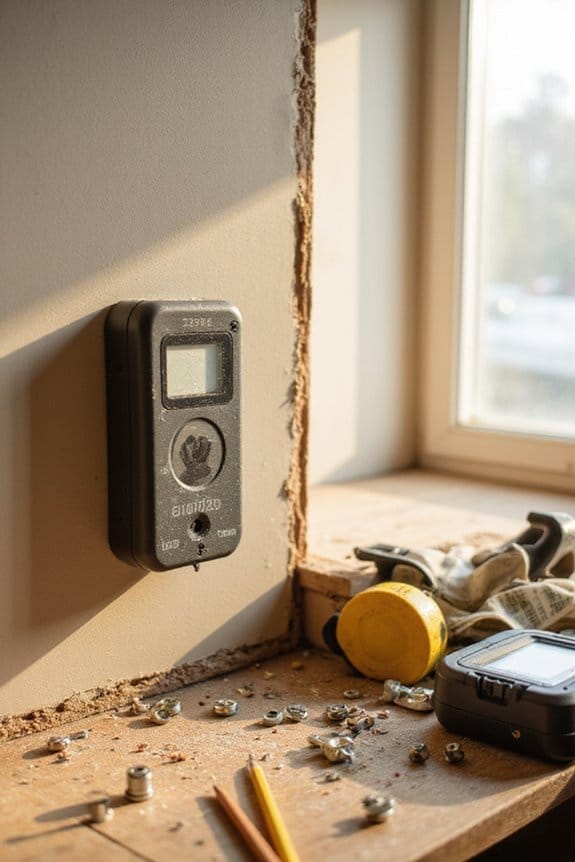
If you’re looking for a reliable and easy way to locate studs in your walls, magnetic stud finders have some real advantages worth considering. Here are a few:
- User Friendly Design: No batteries or complex setups mean you can get right to work. Just slide it along the wall and feel the magnetic pull—easy peasy!
- Cost Effective Solution: They’re generally cheaper than electronic models, making them perfect for those of us on a budget.
- Durability: With fewer components, they’re tough and less likely to break. Plus, many come with a lifetime warranty—talk about confidence!
- Reliability: They consistently detect metal fasteners, reducing the guesswork and ensuring your heavy items are securely mounted.
Trust me; these little tools make life easier!
Limitations of Magnetic Stud Finders
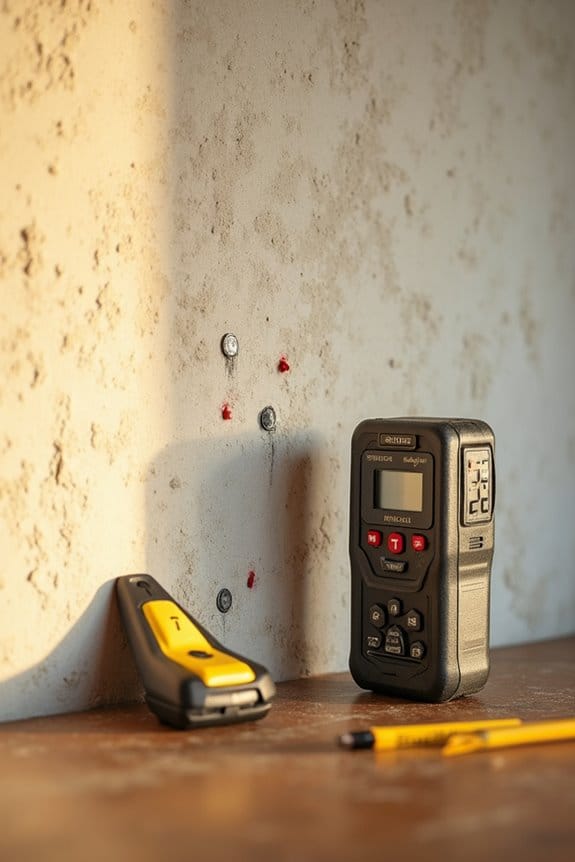
Even though magnetic stud finders have their perks, they also come with some significant limitations that you should know about. Here are the main detection challenges I’ve encountered:
- Limited Detection Range: They rely on metal fasteners, which means if there aren’t enough screws or nails, you’re out of luck.
- User Errors: If you move too quickly or don’t scan thoroughly, you might miss studs or get false positives.
- Metal Confusion: They can’t distinguish between studs and other metal objects like pipes, leading to the potential for mistakes.
- Wall Material Compatibility: Thicker walls or uneven surfaces can make finding studs tricky. Additionally, many modern stud finders, such as the Franklin Sensors ProSensor M210, utilize advanced sensor technology for greater accuracy in detection.
Practical Scenarios for Magnetic Stud Finder Use
Have you ever wondered how magnetic stud finders can simplify your DIY projects? They’re a game-changer for home improvement tasks, and I’ve found several practical scenarios where they shine:
- Hanging Art: When you’re ready to display that perfect picture, a magnetic stud finder quickly reveals stud locations for secure hanging.
- Installing Shelves: Forget about guessing; these tools help guarantee shelves are sturdy by locating those hidden fasteners.
- Light Fixtures: Want to add a new light? Use a magnetic stud finder to find the right spot without fussing with batteries.
- Older Homes: They work well on plaster and drywall, making them reliable for various wall types.
In short, magnetic stud finders make any DIY project smoother and more efficient, especially when paired with essential hand tools to ensure the job is done right.
User Experiences and Reviews
While many tools promise to make home improvement easier, magnetic stud finders often exceed expectations based on user experiences. From user reviews, I’ve noticed a common theme: satisfaction. Here are a few highlights you might find interesting:
- Simplicity: Users love that there’s no battery needed. Just grab it and go!
- Accuracy: Many were pleasantly surprised by how reliably it detects metal fasteners for basic tasks.
- Portability: Its compact design makes it easy to store and carry around, perfect for quick jobs.
- Durability: With no electronic parts, these tools last longer, even after rough handling.
Of course, keep in mind that they may miss studs without metal fasteners. But hey, for occasional use, they’re a solid choice! Additionally, users appreciate that magnetic stud finders are often more durable than electronic tools, making them a reliable option for various projects.
Comparing Magnetic and Electronic Stud Finders
When you’re trying to decide between magnetic and electronic stud finders, it’s important to think about what you’ll actually need them for. Here’s a quick comparison:
- Detection Method: Magnetic finders rely on magnetic reliability, detecting nails and screws, while electronic models sense changes in wall density.
- Accuracy: Magnetic ones work fine for light tasks, like hanging pictures, but electronic finders are better for heavy-duty projects needing precise stud placement.
- Cost: Magnetic models are budget-friendly and simple, while electronic ones, though pricier, offer advanced features like live wire detection.
Ultimately, user preferences will guide your choice. If you want a no-frills option, go magnetic. But for versatility and accuracy, an electronic stud finder might be worth the investment.
Frequently Asked Questions
Can Magnetic Stud Finders Detect Metal Pipes or Electrical Wiring?
Imagine a treasure hunter on a quest; magnetic stud finders are like compasses for metal detection, but they can’t see the hidden wiring identification or non-ferrous treasures. They miss much beneath the surface.
Are There Different Types of Magnetic Stud Finders Available?
Absolutely, there are different types of magnetic stud finders available. I prefer analog models for their simplicity and no battery options, while digital ones offer more features, but I find them less intuitive for quick tasks.
How Do I Maintain My Magnetic Stud Finder?
To maintain my magnetic stud finder, I regularly inspect for corrosion, wipe it clean, and store it properly. Following user tips helps preserve magnetic strength, ensuring accurate readings for all my projects.
Can I Use a Magnetic Stud Finder on Concrete Walls?
I’ve found that using magnetic detection methods on concrete walls isn’t effective. They lack the compatibility needed since concrete doesn’t have accessible metal fasteners. I recommend opting for electronic tools instead for better results.
What Is the Lifespan of a Magnetic Stud Finder?
Did you know a high-quality magnetic stud finder can last decades? Its magnetic durability often outlasts electronic models due to fewer moving parts, and with minimal wear from usage frequency, it’s a smart investment for long-term use.

